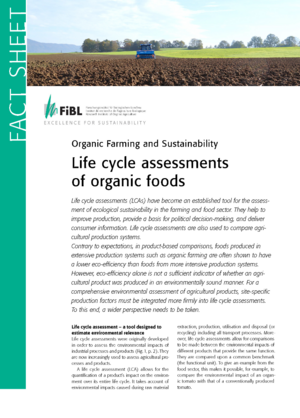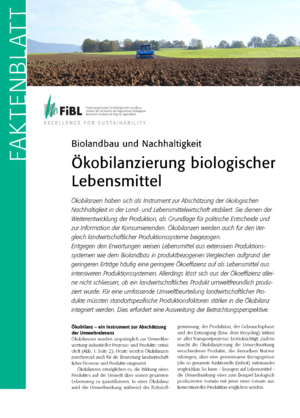Sustainability assessment
Sustainability
Sustainability assessment
-
What FiBL is doing on this theme
- Background: Sustainability assessment
- Department of Food System Sciences, FiBL Switzerland
- Group Evaluation & Impact Assessment, Department of Food System Sciences, FiBL Switzerland
- Groupe Sustainability, Department of Food System Sciences, FiBL Switzerland
- SMART – Sustainability Assessments in the Food and Agriculture Sector
-
News on the theme
- 02/04/2025 : The State of Sustainable Markets 2024: Statistics and Emerging Trends
- 11/11/2021 : Livestock-based food systems need to become more sustainable
- 06/26/2020 : Healthy nutrition from a sustainable food production
- 08/25/2017 : Fact sheet on the life cycle assessment of organic foods
- 01/22/2016 : Strategic partnership for customized sustainability assessments in the food sector
- 12/16/2015 : New study confirms: Global animal production becoming more sustainable by using less concentrate feed
- 10/19/2015 : Compliance to voluntary sustainability standards has grown steadily worldwide
- 08/04/2015 : FiBL sets the table at Expo Milano
- 03/11/2015 : What is your view on sustainability in the organic sector? Survey on thematic priorities
- 06/10/2014 : Is organic farming the prototype for sustainable agriculture? New book with contributions from FiBL authors recently published
- 02/18/2014 : New biogas-handbook for organic farmers
- 09/20/2013 : Take "mosaic" approach to agriculture, boost support for small farmers, UNCTAD Report urges
- 07/27/2012 : New publication: The Bio-Economy Concept: Public goods and the farmer's perspective need attention
- 02/16/2012 : African Organic Agriculture Training Manual: Knowledge shall help make farmers more fit for business
- 01/25/2012 : Final Congress of the Carbon Credits for Sustainable Land Use Systems (CaLas) project
- 01/04/2012 : Integrating reduced tillage and green manures in organic cropping - New European research project has started
-





